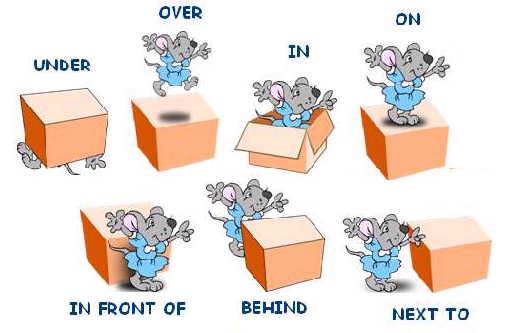A preposition is a word which precedes a noun (or a pronoun) to show the noun's (or the pronoun's) relationship to another
word in the sentence.
Most
prepositions are single words, although there are some that consist of more
than one word, such as out of and in between.
(The
word preposition comes from the idea of being positioned before. It is not
true to say that a preposition always precedes a noun or a pronoun, but it does
most of the time.)
Think
of a preposition as anywhere a
mouse could go:
For example:
Subject + Verb, Preposition, Noun (or gerund / ‘ing’ verb)
Subject
|
Preposition
|
Noun (or gerund)
|
The dog is
|
in
|
the kennel
|
The man sits
|
on
|
the chair
|
The tree is
|
behind
|
the house
|
He got dressed
|
after
|
bathing
|
Here is
a list of common one –word prepositions
that are used to talk about place or destination.
About
|
before
|
Down
|
Opposite
|
Toward (am)
|
Above
|
Behind
|
From
|
Outside
|
Towards
|
Across
|
below
|
In
|
over
|
under
|
Along
|
Beneath
|
Inside
|
Past
|
Underneath
|
Alongside
|
beside
|
Into
|
Round
|
Up
|
Among
|
Between
|
Near
|
Through
|
Within
|
Around
|
Beyond
|
Off
|
Throughout
|
|
at
|
by
|
On
|
to
|
·
Note
that toward and towards are both used in American English, with no differences in
meaning.
Here is
a list of prepositions that consist of more than one word and that are used to
talk about place and destination.
Across from
|
Away from
|
In between
|
Next to
|
Ahead of
|
Close by
|
In front of
|
On top of
|
All over
|
Close to
|
Near to
|
Out of
|
· Be
careful because English has a large amount of prepositions and some of them,
such as beside, by, near and next to are very close in meaning. Other
prepositions, for example at and in, have several different meanings. The
meaning and usage of prepositions should be checked where possible in a
dictionary.


No comments:
Post a Comment